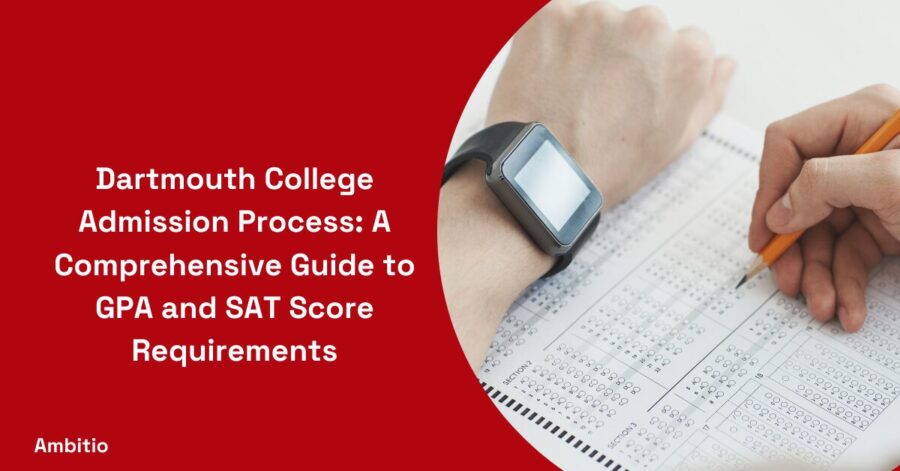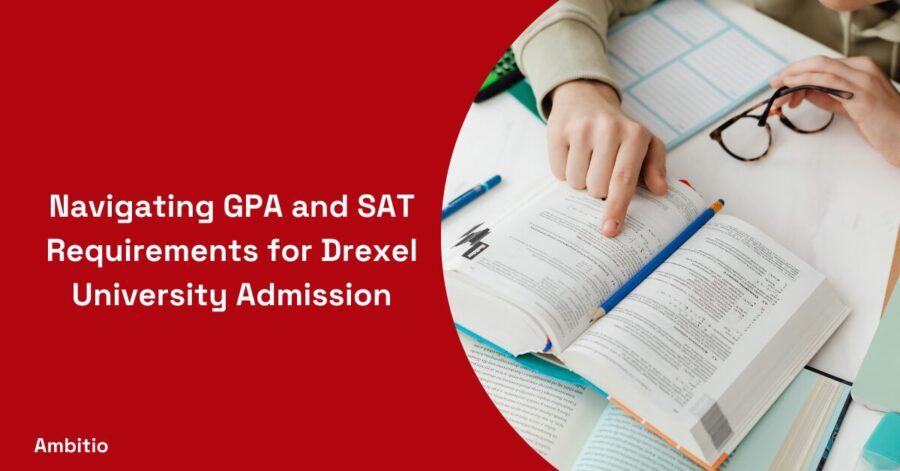12 December 2024
6 minutes read
Mastering the Dartmouth College Admission Process: A Comprehensive Guide to GPA and SAT Score Requirements

Introduction
Gaining admission to Dartmouth College, a member of the esteemed Ivy League, is a dream for many high school students. Known for its rigorous academic standards and selective admissions process, Dartmouth College evaluates applicants based on several criteria, with a particular focus on GPA and SAT scores.
This comprehensive guide aims to demystify the admission requirements of Dartmouth College, providing prospective students with the insights they need to enhance their application.
Understanding Dartmouth’s Academic Expectations
The Critical Role of GPA in Dartmouth’s Admission Decisions
The Significance of a Strong GPA
A high Point Average (GPA) is crucial for applicants to Dartmouth College. The average GPA of admitted students typically hovers around 4.0. This statistic highlights the competitive nature of Dartmouth’s applicant pool.
A strong GPA not only reflects academic excellence but also a student’s ability to handle challenging coursework, a quality Dartmouth highly values.
Strategies for Maximizing Your GPA
For students aspiring to join Dartmouth, focusing on their GPA early in their high school career is essential. It involves more than just excelling in exams; it’s about consistent performance across all subjects.
Advanced Placement (AP) or International Baccalaureate (IB) courses can also positively impact a student’s GPA, demonstrating their ability to succeed in college-level courses.
Dartmouth’s SAT Score Requirements
Understanding Dartmouth’s SAT Score Expectations
Dartmouth College expects high SAT scores from its applicants, typically in the 75th percentile or higher. These scores reflect an applicant’s readiness for the academic rigors of Dartmouth and their ability to perform well in a competitive environment.
Tips for Achieving a Competitive SAT Score
Achieving a competitive SAT score is a crucial part of the college admissions process, especially for institutions like Dartmouth College. Here are some effective strategies to help you maximize your SAT performance:
- Start Early and Set a Study Schedule: Begin your SAT preparation well in advance of your test date. Create a consistent study schedule that allows you to gradually build your skills without cramming.
- Understand the Exam Format: Familiarize yourself with the SAT format, including the types of questions asked in the Math, Critical Reading, and Writing sections. Knowing the structure of the test can help you manage your time effectively during the exam.
- Use Official SAT Practice Resources: Utilize resources from the College Board, such as official SAT practice tests. These materials provide the most accurate representation of the actual test.
- Focus on Your Weak Areas: Identify your weak areas through practice tests and focus your study efforts on improving these. This targeted approach can lead to significant score improvements.
- Learn Time Management Skills: Practice answering questions under timed conditions. Effective time management is crucial for answering all questions within the allocated time during the actual test.
- Master Test-Taking Strategies: Learn and practice key test-taking strategies, such as the process of elimination in multiple-choice questions, making educated guesses, and tackling easier questions first.
- Enhance Your Vocabulary and Reading Skills: Regularly read a variety of texts and work on building your vocabulary. This will be particularly beneficial for the Critical Reading and Writing sections.
- Review Basic Math Concepts: Ensure you have a strong grasp of the math concepts covered on the SAT. Regular practice and reviewing concepts can greatly improve your performance in the Math section.
- Take Practice Tests Under Real Conditions: Simulate real test conditions when taking practice tests. This includes timing yourself, taking only official breaks, and completing the test in one sitting.
- Analyze Your Practice Test Results: Carefully review your answers on practice tests to understand your mistakes. This analysis will help you avoid similar errors in the actual exam.
- Seek Help if Needed: Don’t hesitate to seek help from teachers, tutors, or online resources if you’re struggling with certain topics or strategies.
- Stay Healthy and Stress-Free: Maintain a healthy lifestyle and manage stress. Proper rest, nutrition, and exercise can significantly impact your test performance.
- Develop a Positive Mindset: Maintain a positive attitude towards your SAT preparation. Confidence can greatly influence your test performance.
- Familiarize Yourself with the Test Location: If possible, visit the test center before your exam date. Knowing the location can help reduce anxiety on the day of the test.
By following these strategies, you can enhance your SAT preparation and increase your chances of achieving a score that will be competitive in the Dartmouth College admissions process. Remember, consistent effort and a positive attitude are key to success on the SAT.
GPA and SAT Score: A Balanced Approach
The Interplay Between GPA and SAT Scores in Admissions
While Dartmouth places significant emphasis on both GPA and SAT scores, the admissions committee recognizes that excellence can manifest in various forms.
A slightly lower GPA might be balanced by a high SAT score and vice versa. Dartmouth’s holistic approach to admissions means that neither metric is considered in isolation.
How to Balance Academics with Extracurriculars
Prospective Dartmouth students should strive for academic excellence while engaging in meaningful extracurricular activities. Balancing schoolwork with hobbies, sports, or volunteer work can be challenging, but it demonstrates to Dartmouth that a candidate is well-rounded and capable of managing multiple commitments.
Beyond the Numbers: Dartmouth’s Holistic Admission Process
The Importance of Extracurricular Involvement
Making Your Application Stand Out with Extracurriculars
Dartmouth values students who exhibit leadership, commitment, and passion through their extracurricular activities. Involvement in clubs, sports, arts, or community service can significantly enhance an application. It’s not about the quantity of activities, but the quality and impact of your involvement.
Choosing the Right Extracurricular Activities
When selecting extracurriculars, students should focus on areas that genuinely interest them. Whether it’s leading a club, excelling in a sport, or volunteering in the community, authentic engagement is key. Dartmouth looks for students who will contribute positively to campus life beyond academics.
Crafting a Compelling Personal Essay
The Power of a Well-Written Essay
The personal essay is a critical component of the Dartmouth application. It’s an opportunity for students to showcase their personalities, experiences, and perspectives.
A compelling essay can provide context to academic achievements and highlight a student’s unique qualities.
Tips for Writing a Standout Essay
When writing their essay, students should aim to be authentic and reflective. Narratives that tell a personal story or illustrate a significant challenge overcome can be particularly effective. The essay should be well-written, and thoughtful, and provide insight into the student’s character and aspirations.
Letters of Recommendation: An Insight into Your Academic and Personal Qualities
The Impact of Strong Recommendations
Letters of recommendation provide Dartmouth’s admissions committee with an external perspective on an applicant’s academic ability and personal qualities.
Recommendations from teachers who can attest to a student’s intellectual curiosity, work ethic, and class contributions are particularly valuable.
How to Secure Effective Recommendations
Students should request recommendations from teachers who know them well and can speak to their strengths and potential.
It’s important to ask for these letters well in advance and provide recommenders with relevant information about your academic and extracurricular achievements to aid in writing a comprehensive recommendation.
Final Steps in the Dartmouth College Admissions Process
Understanding Dartmouth’s Interview Process
The Role of Alumni Interviews in Admissions
Some Dartmouth applicants may have the opportunity to participate in an alumni interview. While not a mandatory part of the application, interviews can provide additional context to an application and allow students to express their interest in Dartmouth more personally.
Preparing for a Successful Interview
To prepare for the interview, students should research Dartmouth College thoroughly, practice answering common interview questions, and think about how they can contribute to the Dartmouth community.
It’s also important to be yourself and engage in a genuine conversation with the interviewer.
Navigating the Final Application Review and Decision
The Comprehensive Review Process
After submitting their application, students undergo a comprehensive review by Dartmouth’s admissions committee. This process takes into account all aspects of the application, including academic performance, standardized test scores, essays, recommendations, and extracurricular activities.
Managing Expectations and Planning for the Future
While waiting for a decision, it’s important for students to manage their expectations and remain positive, regardless of the outcome. Students should also plan for various scenarios, including being waitlisted or considering other colleges where they have applied.
Conclusion
Securing admission to Dartmouth College requires dedication, hard work, and a well-rounded application. Prospective students must focus on maintaining a strong GPA and SAT score while also engaging in meaningful extracurricular activities, writing a compelling personal essay, and securing strong letters of recommendation.
Understanding and navigating the Dartmouth admissions process with these factors in mind can greatly enhance a student’s chance of success.
FAQs
What makes Dartmouth’s admission process unique?
Dartmouth’s admission process is holistic, considering not just academic metrics like GPA and SAT scores, but also a student’s character, extracurricular activities, essays, and recommendations.
How can international students improve their chances of getting into Dartmouth?
International students should focus on achieving high academic standards, demonstrating English proficiency, and showcasing their unique cultural perspectives and experiences.
What are some common mistakes to avoid in the Dartmouth application?
Common mistakes include neglecting the essay or extracurricular sections, submitting a generic application, and failing to demonstrate a genuine interest in Dartmouth.
Can students apply to Dartmouth without SAT scores?
While SAT scores are an important aspect of the application, Dartmouth considers applications holistically and may waive this requirement in certain circumstances.
How does Dartmouth view AP or IB courses in the application process?
Dartmouth values AP and IB courses as they demonstrate a student’s ability to succeed in challenging academic environments. Success in these courses can positively impact an application.

You can study at top universities worldwide!
Get expert tips and tricks to get into top universities with a free expert session.
Book Your Free 30-Minute Session Now! Book a call now




























